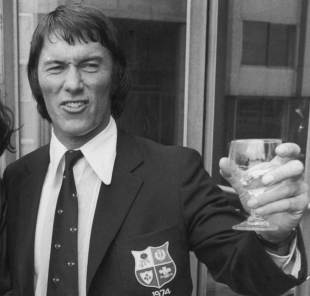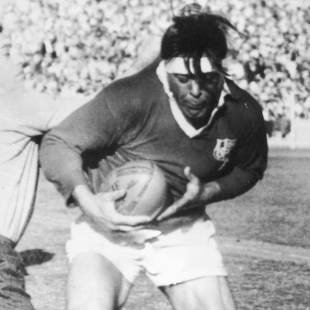|
British & Irish Lions
'Our boots were confiscated on arrival'
Tom Hamilton
June 20, 2013

Ken Kennedy - a man with four Lions Test caps
© Getty Images
Enlarge
The 1966 British & Irish Lions tour to Australia and New Zealand proved to be a seminal journey in the tourists' history. The Lions spent 144 days abroad - a length of time that would never be repeated again. They also had a coach for the first time rather than the previous arrangement of tour manager and captain. It was a tour that tried to see the Lions evolve and move into line with the ever-changing rugby landscape. The basic facts of the tour saw the Lions come away from Australia with a 2-0 victory while they crashed to the All Blacks 4-0. But despite the eventual loss to the Kiwis and negative reverberations from the tour, which pointed towards confusion in the management and some players finding it an arduous experience, for those who were on their first tour with the historic side, they had the time of their life. For Ken Kennedy, now a renowned back specialist with cricketer Sachin Tendulkar among his clientele, it was the opportunity to plunge into the unknown. The sprightly 24-year-old had only played eight Test matches for Ireland when he got the call but he was one of five Ulstermen to make the grade in '66 - alongside Mike Gibson, Roger Young, Ronnie Lamont and Willie John McBride. His experiences in 1966 were a world away from what the 2013 vintage will encounter. "When I was called up to the tour, I was a doctor in my first year as a houseman," Kennedy told ESPN. "My pay stopped on the first day I stepped out of the door and got the BEA flight to London where we had maybe four days in Bournemouth training and meeting people and getting accustomed to the different ways of life of all the different players. "We got equipped to go on the Lions tour, which was a four and a half month trip. They gave us a pair of boots; they fitted us for two blazers, two pairs of trousers and two ties. The rest you had to get yourself. So, my club bought me a tracksuit and we got given two towels, which were very useful. And that was the preparation. We had some, what you might call rugby factoring put in with scrums, lineouts - all unopposed. And off we went on a plane to Australia. We had four or five days of pretty average training and pretty negligible kitting out before we went away. "We arrived in Perth and our boots were confiscated as we had worn them in London, so we trained in our first session in tracksuits while our boots were, whatever they do, fumigated." There was a wonderful innocence of the whole tour - when talking to Kennedy it was clear that the Lions were there for the love of the game, there was no financial incentive whatsoever. Kennedy's salary from the NHS stopped from the day he left for the Lions and upon returning he was greeted by a bill for the breakfast he had prior to flying out. And while they were away, they got A$1 a day and that "was to pay for toothpaste, laces, whatever".

© Campbell Studios, Dunedin
Enlarge
And they also went out of their way to prove to the locals they were "honest God-loving people" and any trips to the local High Commission for a cocktail party were aided by the Lions choir - the players had their own song sheets with Dewi Bebb their choirmaster. But while they were short of cash, they never went hungry or thirsty. The Australian public welcomed the Lions with open arms, as Kennedy remembered. "The Australian public have a wealth of sporting riches to watch and rugby union was about third down the list. For all our matches we had great crowds and we had capacity attendances for the two Tests. They were very keen on sport and even keener to beat anything British. They were immensely friendly and did everything off the pitch to help you. "You say to people there - I want to go fishing or water skiing and they set it up. I also flew someone's plane after staying at their beach house for a day. You didn't need for money and therefore you didn't think about it. You played for your country or team, rather than thinking in terms of getting £1k for sitting on the bench or £2k if you're starting." And the camaraderie within the group saw a breakdown of nationality boundaries - the Welsh mixed with the Irish and so on - there "weren't any cabals", Kennedy emphasised. And inevitably alongside a lengthy spell of time away, came the odd night out. But there was no dwarf tossing exclusives on this tour, the media and the players went with one common goal - to contribute to a successful Lions tour. "If you go back to the 60's the guys who came on the tour were rugby writers. They weren't looking for stories of people maybe having an affair or too much to drink," Kennedy explained. "They were just writing pure stories about rugby. With the British media it was good. With some of the writers in New Zealand there was a paper who tried to set-up a player trying to sell his match tickets as we had no money. That was not allowed. That made people a bit suspicious of foreign journalists but by and large the Australian press and more of the Kiwi press were good.

Skipper Michael Campbell-Lamerton takes the game to Australia
© Getty Images
Enlarge
"There weren't any society columnists to talk about pink hair or whether someone doesn't wear socks. But that has crept into it now such as when you had Tuilagi swimming in New Zealand. I don't remember anything happening like dwarf throwing in my era. Guys would hose each other down in hotels so there might've been some damage there - in 1968 they used to have a tie fire where anyone who walked into the hotel would have their tie burnt. They were more pranks and a chance to escape in an attempt to decrease pressure." And in Australia, the relaxed off-field attitude transferred into form on the field. They beat the Wallabies 11-8 and 31-0. The trip to New Zealand was less successful, but then again, only one Lions squad have emerged from the 'Land of the Long White Cloud' with a series victory. For Kennedy the Lions journey was to continue eight years later when he was named in the 1974 squad that was later labelled 'The Invincibles' following their unbeaten tour of South Africa. He split his time between playing and being the team's unofficial doctor as he sought to develop his own understanding of the rugby-playing individual. It helped the development of his professional career, but his experiences in '66 and '74 were rooted in amateurism and fun - something that Sir Ian McGeechan tried to replicate in 1997 and 2009. Warren Gatland's squad are now looking to follow a similar pattern but while his party will now stand alongside the 1966 group as two sets of Lions who have toured Australia, their experiences will be a world apart. © ESPN Sports Media Ltd. Tom Hamilton is the Assistant Editor of ESPNscrum.
|
Live Sports
Communication error please reload the page.
-
Football
-
Cricket
-
Rugby
-
- Days
- Hrs
- Mins
- Secs
F1 - Abu Dhabi GP
Abu Dhabi Grand Prix December 11-131. Max Verstappen ()
2. Valtteri Bottas (Mercedes)
3. Lewis Hamilton (Mercedes)
4. Alexander Albon ()
5. Lando Norris ()
6. Carlos Sainz Jr ()
-
ESPNOtherLive >>
Golf - Houston Open
Snooker - China Open
Tennis - Miami Open

